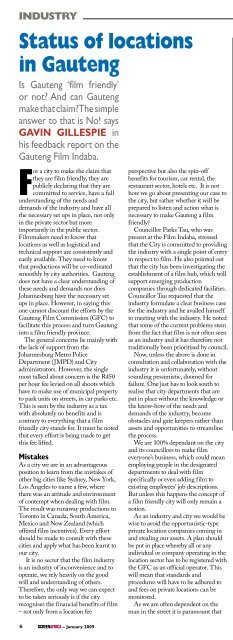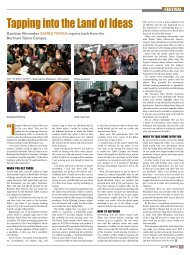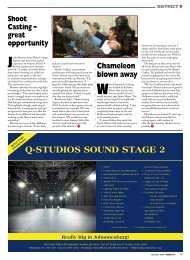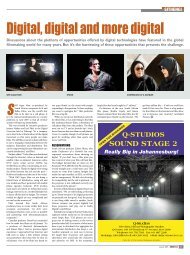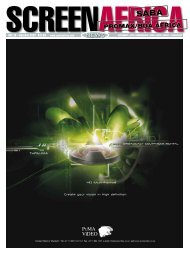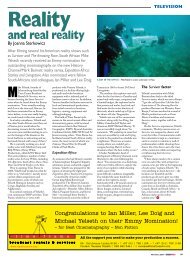Download Part 1 - size: 2.0mb - Screen Africa
Download Part 1 - size: 2.0mb - Screen Africa
Download Part 1 - size: 2.0mb - Screen Africa
You also want an ePaper? Increase the reach of your titles
YUMPU automatically turns print PDFs into web optimized ePapers that Google loves.
INDUSTRY<br />
Status of locations<br />
in Gauteng<br />
Is Gauteng ‘film friendly'<br />
or not? And can Gauteng<br />
make that claim? The simple<br />
answer to that is No! says<br />
GAVIN GILLESPIE in<br />
his feedback report on the<br />
Gauteng Film Indaba.<br />
For a city to make the claim that<br />
they are film friendly, they are<br />
publicly declaring that they are<br />
committed to service, have a full<br />
understanding of the needs and<br />
demands of the industry and have all<br />
the necessary set ups in place, not only<br />
in the private sector but more<br />
importantly in the public sector.<br />
Filmmakers need to know that<br />
locations as well as logistical and<br />
technical support are consistently and<br />
easily available. They need to know<br />
that productions will be co-ordinated<br />
smoothly by city authorities. Gauteng<br />
does not have a clear understanding of<br />
these needs and demands nor does<br />
Johannesburg have the necessary set<br />
ups in place. However, in saying this<br />
one cannot discount the efforts by the<br />
Gauteng Film Commission (GFC) to<br />
facilitate this process and turn Gauteng<br />
into a film friendly province.<br />
The general concerns lie mainly with<br />
the lack of support from the<br />
Johannesburg Metro Police<br />
Department (JMPD) and City<br />
administrators. However, the single<br />
most talked about concern is the R450<br />
per hour fee levied on all shoots which<br />
have to make use of municipal property<br />
to park units on streets, in car parks etc.<br />
This is seen by the industry as a tax<br />
with absolutely no benefits and is<br />
contrary to everything that a film<br />
friendly city stands for. It must be noted<br />
that every effort is being made to get<br />
this fee lifted.<br />
Mistakes<br />
As a city we are in an advantageous<br />
position to learn from the mistakes of<br />
other big cities like Sydney, New York,<br />
Los Angeles to name a few, where<br />
there was an attitude and environment<br />
of contempt when dealing with film.<br />
The result was runaway productions to<br />
Toronto in Canada, South America,<br />
Mexico and New Zealand (which<br />
offered film incentives). Every effort<br />
should be made to consult with these<br />
cities and apply what has been learnt to<br />
our city.<br />
It is no secret that the film industry<br />
is an industry of inconvenience and to<br />
operate, we rely heavily on the good<br />
will and understanding of others.<br />
Therefore, the only way we can expect<br />
to be taken seriously is if the city<br />
recognises the financial benefits of film<br />
– not only from a location fee<br />
perspective but also the spin-off<br />
benefits for tourism, car rental, the<br />
restaurant sector, hotels etc. It is not<br />
how we go about presenting our case to<br />
the city, but rather whether it will be<br />
prepared to listen and action what is<br />
necessary to make Gauteng a film<br />
friendly?<br />
Councillor Parks Tau, who was<br />
present at the Film Indaba, stressed<br />
that the City is committed to providing<br />
the industry with a single point of entry<br />
in respect to film. He also pointed out<br />
that the city has been investigating the<br />
establishment of a film hub, which will<br />
support emerging production<br />
companies through dedicated facilities.<br />
Councillor Tau requested that the<br />
industry formulate a clear business case<br />
for the industry and he availed himself<br />
to meeting with the industry. He noted<br />
that some of the current problems stem<br />
from the fact that film is not often seen<br />
as an industry and it has therefore not<br />
traditionally been prioritised by council.<br />
Now, unless the above is done in<br />
consultation and collaboration with the<br />
industry it is unfortunately, without<br />
sounding pessimistic, doomed for<br />
failure. One just has to look south to<br />
realise that city departments that are<br />
put in place without the knowledge or<br />
the know-how of the needs and<br />
demands of the industry, become<br />
obstacles and gate keepers rather than<br />
assets and opportunities to streamline<br />
the process.<br />
We are 100% dependant on the city<br />
and its councillors to make film<br />
everyone’s business, which could mean<br />
employing people in the designated<br />
departments to deal with film<br />
specifically or even adding film to<br />
existing employees’ job descriptions.<br />
But unless this happens the concept of<br />
a film friendly city will only remain a<br />
notion.<br />
As an industry and city we would be<br />
wise to avoid the opportunistic-type<br />
private location companies coming in<br />
and stealing our assets. A plan should<br />
be put in place whereby all or any<br />
individual or company operating in the<br />
location sector has to be registered with<br />
the GFC as an official operator. This<br />
will mean that standards and<br />
procedures will have to be adhered to<br />
and fees on private locations can be<br />
monitored.<br />
As we are often dependent on the<br />
man in the street it is paramount that<br />
Permit fees<br />
questioned<br />
The R450 per hour fee levied on all shoots when making use of<br />
Johannesburg municipal property and the lack of support by the<br />
Johannesburg Metro Police Department (JMPD) was hotly criticised by<br />
panellists taking part in a special 2008 Film Indaba session on the<br />
thorny question of whether Gauteng could claim to be ‘film friendly’.<br />
Shrinking local and worldwide budgets together with the rising cost of<br />
production, meant that producers had to consider the cost of shooting in a<br />
particular location.<br />
According to Gavin Gillespie, Fresh Eye Films Production, part of the<br />
problem lay with provincial and municipal departments which did not<br />
recognise film as a legitimate industry in Gauteng. This gave rise to a lack of<br />
sensitivity to the needs of the industry.<br />
“We are all fighting the battle of finance. We simply can’t afford the R450<br />
per hour permit fee. There are also no financial incentives to attract<br />
international productions to the province.”<br />
In dealing with departments like the JMPD, producers were continually<br />
frustrated by the lack of response to requests. “We don’t have the luxury of<br />
waiting for a month to know whether we can shoot on the Nelson Mandela<br />
bridge. We are a R750m industry but we are not recognised. Mostly we are<br />
seen as irritating and obstructive by the departments we have to deal with,”<br />
said Gillespie.<br />
Cape Town film consultant, Martin Cuff who chaired the discussion,<br />
confirmed that in his research on the permit situation he received no return<br />
calls from municipal departments he had contacted. “We need to make<br />
government departments understand that film is a core business of the<br />
country’s economic development.”<br />
Rehad Desai, representing the South <strong>Africa</strong>n <strong>Screen</strong> Federation (SASFED),<br />
said that the appeal of locations were intrinsically linked to financial incentives.<br />
“People go where the incentives are. Government’s commitment of resources is<br />
also too short term. It can take 15 years to create and shoot a production.”<br />
Speaking about the experience of the Sante Fe Film Office, New Mexico in<br />
the US, Lisa Van Allen explained that the State government was good about<br />
supporting film with incentives. “Sante Fe charges only a nominal fee for<br />
officers and parking in municipal areas. Basically we have a permit simply to<br />
track the number of productions shot in the city.”<br />
Councilor Parks Tau of the City of Johannesburg said the industry needed to<br />
engage with him and his department more closely. He saw the creation of a<br />
film production hub as playing a role in facilitating production support and<br />
accessibility in the city. “The approach needs to be two prong: to define<br />
problems and find solutions.”<br />
Commenting from the floor, Barry Munchik, Velocity Films, said that<br />
commercial production was down by 50 to 70% which affected job creation.<br />
“We need a low cost friendly city and we will probably be able to create 500<br />
jobs.” The only reason commercials were coming back to the country was the<br />
very favourable rate of exchange of the Rand to the Euro and Dollar.<br />
the GFC embark on a local marketing<br />
exercise in newspapers and local<br />
gazettes to inform the citizens of<br />
Gauteng about the benefits of film.<br />
The general public need to know that a<br />
Commission exists, and that they can<br />
contact the GFC when seeking advice<br />
about concerns relating to the industry.<br />
A film friendly city relies not only on<br />
the local government but on the<br />
attitude and co-operation of its people<br />
as well.<br />
Fee increase<br />
There is the concern that the<br />
privatisation and refurbishment of the<br />
city centre by big business has caused<br />
location fees to increase substantially,<br />
making them unaffordable. In some<br />
cases, certain city landmarks have<br />
become no film zones because of this.<br />
It is these locations that make our city<br />
the attractive city it is and losing them<br />
puts us in a very compromising position<br />
when attempting to market Gauteng as<br />
a filming destination. Again, we call<br />
upon the GFC and local government to<br />
facilitate meetings with these industries<br />
to educate them on the need for cooperation<br />
and the benefits of film.<br />
Can Gauteng become a film friendly<br />
city? Yes, on the premise of a strong<br />
economic argument and through<br />
greater liaison between the GFC,<br />
industry and regions. But time is of the<br />
essence. While we drag our heels and<br />
get bogged down in bureaucracy, other<br />
cities are putting plans in place to<br />
capitalise from film. We would be<br />
fools to waste such an incredible<br />
opportunity.<br />
• Gavin Gillespie is an executive producer<br />
with Fresh Eye Films Productions and a<br />
member of the Commercial Producers<br />
Association. The above report by Gillespie<br />
has been edited.<br />
<br />
SCREENAFRICA – January 2009


